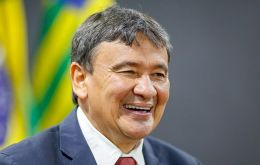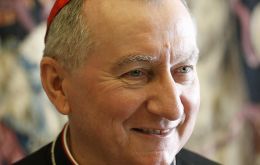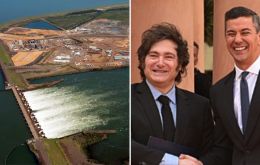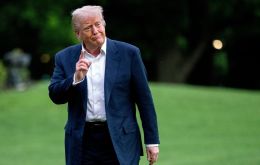MercoPress. South Atlantic News Agency
Stories for May 7th 2025
-
Wednesday, May 7th 2025 - 19:34 UTC
Brazil tackling famine crisis by suspending fraudulent benefits

Brazilian Minister of Development and Social Assistance Wellington Dias highlighted Wednesday that his country, one of the world's leading food producers, was beginning to overcome its famine problem affecting over 33 million people. He made those remarks during the Bom Dia Ministro broadcast show on the State-run EBC station.
-
Wednesday, May 7th 2025 - 19:04 UTC
Conclave to pick new Pope under session

The conclave to elect Pope Francis' successor began Wednesday with 133 cardinals locked in the Sistine Chapel, isolated from the outside world. The process started with the “extra omnes” prayer, signaling the closure of the chapel doors. The cardinals, sworn to secrecy, will vote until a new pope is chosen by a two-thirds majority (89 votes). The first vote would be voting in the afternoon, with smoke -black or white- expected any minute.
-
Wednesday, May 7th 2025 - 10:55 UTC
Milei adjusts Yacyretá tariff ahead of new operating agreement

Argentine President Javier Milei signed Decree No. 303/2025, authorizing a new Operating Agreement for the Yacyretá Hydroelectric Power Plant, a binational entity co-owned by Argentina and Paraguay. The agreement sets a tariff increase from US$17 to US$28 per megawatt-hour (MWh) to optimize supply, ensure financial stability, and support technological modernization
-
Wednesday, May 7th 2025 - 10:41 UTC
Brazil's STF indicts 7 others in “Parallel Abin” case

Brazil's Supreme Federal Court (STF) unanimously decided to indict seven more people in connection with a coup plot during the government of former President Jair Bolsonaro.
-
Wednesday, May 7th 2025 - 10:32 UTC
Trump wants movies produced in the US

US President Donald Trump announced plans to impose a 100% tariff on foreign films, citing national security concerns and the decline of the American film industry. The measure aims to counter incentives offered by other countries, like Canada and the UK, which attract US filmmakers and studios, leading to reduced production in Hollywood. “We want movies made in the United States!” he insisted.
-
Wednesday, May 7th 2025 - 10:28 UTC
Asylum-seekers at Argentina's Embassy extracted from Venezuela

Venezuelan opposition leaders Pedro Urruchurtu, Humberto Villalobos, Claudia Macero, Omar González, and Magalí Meda, who had been under asylum at the Argentine Embassy in Caracas since March 20, 2024, have left Venezuela, it was reported Tuesday.
-
Wednesday, May 7th 2025 - 08:46 UTC
Friedrich Merz becomes Germany's new Chancellor

Friedrich Merz of the Christian Democratic Union (CDU) was elected Chancellor of Germany on Tuesday after the second round of Bundestag voting, in which he was given 325 endorsements (thus surpassing the 316 minimum requirement), with 289 rejections and one abstention. No prospective chancellor in post-war Germany had previously failed the first vote after securing a coalition agreement.
